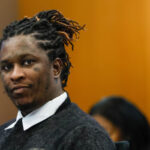Rodney G. King, whose 1991 videotaped beating by the Los Angeles police became a symbol of the nation’s continuing racial tensions and subsequently led to a week of deadly race riots after the officers were acquitted, was found dead Sunday in a swimming pool at the home he shared with his fiancée in Rialto, Calif. He was 47.
There was no evidence of foul play, the Rialto police said.
Mr. King, whose life was a roller coaster of drug and alcohol abuse, multiple arrests and unwanted celebrity, pleaded for calm during the 1992 riots. More than 55 people were killed and 600 buildings destroyed in the violence.
In a phrase that became part of American culture, he asked at a news conference, “Can we all get along?”
“People look at me like I should have been like Malcolm X or Martin Luther King or Rosa Parks,” he told The Los Angeles Times in April. “I should have seen life like that and stay out of trouble, and don’t do this and don’t do that. But it’s hard to live up to some people’s expectations.”
Mr. King published a memoir in April detailing his struggles, saying in several interviews that he had not been able to find steady work.
He said he had once blamed politicians and lawyers
“for taking a battered and confused addict and trying to make him into a symbol for civil rights.” But he was unable to escape that role. On Sunday, the Rev. Al Sharpton, said in a statement, “History will record that it was Rodney King’s beating and his actions that made America deal with the excessive misconduct of law enforcement.”
And more recently, Mr. King seemed to embrace the role himself, saying that his beating enabled others to succeed and “made the world a better place.”
“Obama, he wouldn’t have been in office without what happened to me and a lot of black people before me,” he told The Los Angeles Times. “He would never have been in that situation, no doubt in my mind. He would get there eventually, but it would have been a lot longer. So I am glad for what I went through. It opened the doors for a lot of people.”
Though Mr. King wrote in his memoir that he still drank and used drugs occasionally, he insisted that, with his fiancée, Cynthia Kelley, who had been a juror in a civil suit he brought against the City of Los Angeles, he was on the road to reclaiming his life.
“I realize I will always be the poster child for police brutality,” he said, “but I can try to use that as a positive force for healing and restraint.”
Mr. King said he was essentially broke, though he said he received an advance for his book, “The Riot Within: My Journey from Rebellion to Redemption,” published to coincide with the 20th anniversary of the riots.
He still walked with a limp and several of his scars were visible. His best outlets for relaxation, he said, were fishing and swimming.
The police in Rialto, 50 miles east of Los Angeles, said they received a 911 call at 5:25 a.m. Sunday from Ms. Kelley, who reported finding him in the pool that Mr. King had built himself, inscribing the date of his beating and the start of the riots in two tiles. Emergency personnel tried to resuscitate him, but he was pronounced dead at the hospital at 6:11 a.m.
Capt. Randy De Anda said that Mr. King had been at the pool throughout the early morning and had been talking to Ms. Kelley, who was in the house at the time. Neighbors reported hearing music, talking and crying before hearing a splash.
A pair of sandals was still sitting next to the pool, visible from a neighbor’s backyard. Mr. King had apparently started to build a new fence to keep neighbors from looking in, but never completed it. One neighbor said that Mr. King mowed her family’s lawn weekly and that she often saw him swimming late at night.
On the night when the police beating occurred, March 3, 1991, Mr. King had been out on parole on a 1989 robbery conviction.
He was driving about 100 miles per hour when he and two passengers were pulled over by the Los Angeles police. After he attempted to escape on foot — afraid, he would later say, that he would be in violation of his parole — he was caught by officers. The 6-foot-3 Mr. King was struck with batons and kicked dozens of times, and hit with Tasers.
“It felt like I was an inch from death,” he said in recent interviews.
Video of the beating, recorded by George Holliday, a resident of a nearby apartment building, was repeatedly broadcast on television, inflaming anger over what was seen as a pattern of aggression and abuse by the Los Angeles police toward blacks and Hispanics. After intense public outcry, four officers were brought to trial.
Many people thought the video alone would lead to the conviction of the officers. But on April 29, 1992, a jury in Simi Valley, Calif., which included no black jurors, acquitted three of the officers, and a mistrial was declared for the fourth.
It touched off riots in South Los Angeles, among the worst in the nation’s history, resulting in damage estimated at $1 billion.
The four white officers charged with beating Mr. King — Stacey Koon, Theodore Briseno, Timothy Wind and Laurence Powell — were indicted in the summer of 1992 on federal civil rights charges. Officers Koon and Powell were convicted and sentenced to two years in prison, and Mr. King was awarded $3.8 million in damages.
The Los Angeles police chief, Daryl Gates, resigned under pressure amid criticism that officers were slow to respond to the riots. He died of cancer in 2010.
Mr. King spent much of the money he received on legal fees. He also bought cars and houses, including the modest house in which he lived, and invested in a rap music label called Straight Alta-Pazz, which failed.
But much of his life was consumed by tabloid drama. He spent the subsequent years in and out of jail and rehabilitation centers, mostly for drug and alcohol abuse. He was arrested multiple times for driving under the influence, and spent short periods in prison in the late 1990s for assaulting his former wife and his daughter. In recent years he had appeared on the television shows “Celebrity Rehab” and “Sober House” on VH1.
Rodney Glen King was born on April 2, 1965, in Sacramento, the youngest of five children. He grew up in Altadena, near Pasadena, raised by his mother, Odessa King, and an alcoholic father, Ronald King, who died at 42.
Mr. King was married twice. Survivors include his daughters, Lora and Candice King, and a third daughter whose name was not immediately available.
In an interview in April, Mr. King said he understood how posterity would view him.
“It’s taken years to get used to the situation I’m in in life and the weight it holds. One of the cops in the jail said: ‘You know what? People are going to know who you are when you’re dead and gone. A hundred years from now, people still going to be talking about you.’ It’s scary, but at the same time it’s a blessing.”

![Da Brat Marries Judy Dupart on 2.22.22 [PHOTOS]](https://hiphopucit.com/wp-content/uploads/2022/02/1645669184565-440x264.jpeg)
![Drake Reveals Photos of His Son Adonis [Photos]](https://hiphopucit.com/wp-content/uploads/2020/03/Drake-and-on-Adonis-HHUCIT.jpg)

![Megan Thee Stallion – “BOA” [NEW VIDEO]](https://hiphopucit.com/wp-content/uploads/2024/05/Megan_Thee_Stallion___BOA__Official_Video__1_12_screenshot-440x264.jpg)
![Doechii Feat. JT – “Alter Ego” [NEW VIDEO]](https://hiphopucit.com/wp-content/uploads/2024/05/Screenshot-of-Doechii-and-JTs-Al-440x264.png)
![Young Thug Feat. Drake Drop – “Oh U Went” [NEW VIDEO]](https://hiphopucit.com/wp-content/uploads/2023/07/Young-Thug-and-Drake-1014x570-1-440x264.png)


![Armed Robbery Suspects in Safaree’s Case Apprehended [VIDEO]](https://hiphopucit.com/wp-content/uploads/2018/04/safaree-fur.jpg)






